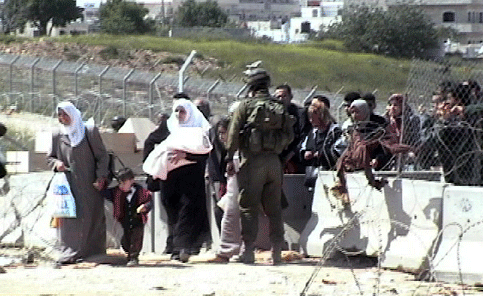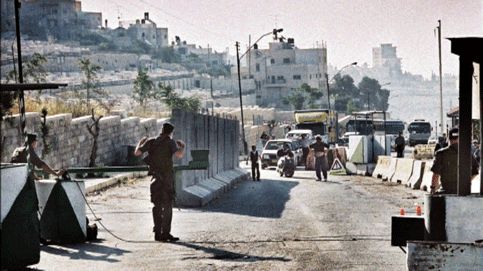Amnesty International 8 September 2003

Palestinian civilians waiting in line at Qalandia checkpoint between Ramallah and Ar-Ram (Photo: AEF, 2002)
“Israel must put an end to the imposition of disproportionate and discriminatory restrictions on Palestinians’ movement in the Occupied Territories which have crippled the Palestinian economy and caused widespread poverty, unemployment and increasing health problems,” Amnesty International said in a report published today.
Closures, blockades, checkpoints, curfews and a barrage of other restrictions imposed by the Israeli army on Palestinians have made even short journeys between towns and villages difficult, dangerous and often impossible - effectively confining some three and a half million Palestinians to a form of town arrest.
The report Surviving under siege - The impact of movement restrictions on the right to work examines the impact of these restrictions. The restrictions have often prevented Palestinians from reaching their workplaces or distributing their products and factories and farms have been driven out of business by losses incurred, dramatically increased transport costs and loss of export markets. Unemployment has soared to over 50 percent, more than half the population is now living below the poverty line and malnutrition and other illnesses have increased.
Most Palestinians in the Occupied Territories are forced to rely, to some degree at least, on charity for food and other basic needs.
“The existence of charity and humanitarian assistance do not absolve Israel from its obligation to ensure the Palestinians’ right to work, so that they can feed themselves and their families with dignity,” said Amnesty International.

A Palestinian driver has to lift his shirt. This military roadblock in Azaria, near Abu Dis, doesn’t exist anymore. It has been replaced by the wall denying Palestinian access to East Jerusalem (Photo: Ronald de Hommel, 2002)
Israel has the right to take reasonable, necessary and proportionate measures to protect the security of its citizens and its borders from attacks by Palestinian armed groups, including by restricting access to its territory. However it does not have the right to impose arbitrary, discriminatory or collective measures and punishment on the Palestinian population.
As an occupying power, Israel has an obligation under international law to ensure freedom of movement, an adequate standard of living, and as normal a life as possible to the population in the occupied territories. The sweeping restrictions imposed by Israel violate these obligations. Such restrictions also in many cases constitute collective punishment - prohibited by international law.
“Hundreds of thousands of Palestinians cannot be made to pay for the crimes of a handful of individuals,” Amnesty International stressed. “Any restrictions on the movement of people and goods should be imposed only in relation to a specific security threat and if they are non-discriminatory, necessary and proportionate in scope and duration.”
The construction in recent months of a wall/fence inside the West Bank has resulted in further restrictions on the movement of Palestinians, cutting tens of thousands of people from the rest of the West Bank and/or from their farming land and irrigation water.
“Israel must refrain from constructing walls/fences or other permanent structures inside the Occupied Territories which constitute or result in permanent restrictions on the free movement of Palestinians within the Occupied Territory or in the arbitrary destruction or seizure of their property,” said Amnesty International.
Israel contends that the wall/fence is being built to prevent Palestinians from entering Israel to carry out attacks. Yet, the wall/fence runs mostly deep inside the West Bank, and not on the pre-1967 border between Israel and the West Bank. This, in order to isolate the local Palestinian communities from nearby Israeli settlements, which have been established in violation of international law.
Amnesty International also urged Israel to put an immediate end to the construction or expansion of Israeli settlements and related infrastructure and to take measures to evacuate Israeli settlers from the West Bank and Gaza Strip.
“Israel should have never transferred its civilian population into the Occupied Territories. This is a violation of international humanitarian law. Now Israel must remedy this violation by taking concrete measures to evacuate the settlers,” said the organization. “Not only are the settlements illegal, they are constructed and maintained in a discriminatory manner and are the proximate cause of so many of the arbitrary restrictions on movement and other human rights abuses.”
Amnesty International also reiterated its call on Palestinian armed groups to put an immediate end to their policy of killing and targeting Israeli civilians, including settlers, whether inside Israel or in the Occupied Territories.
“Similarly, the Palestinian Authority should take urgent measures to prevent such attacks by Palestinian armed groups and carry out thorough investigations in all cases,” the organization said. “The Palestinian Authority must also ensure that those responsible for such attacks are brought to justice in proceedings that meet international standards for fair trial.”
Amnesty International reiterated its call on the Israeli authorities to put an immediate end to the practice of extrajudicial executions and other killings of civilians.
Related Links: